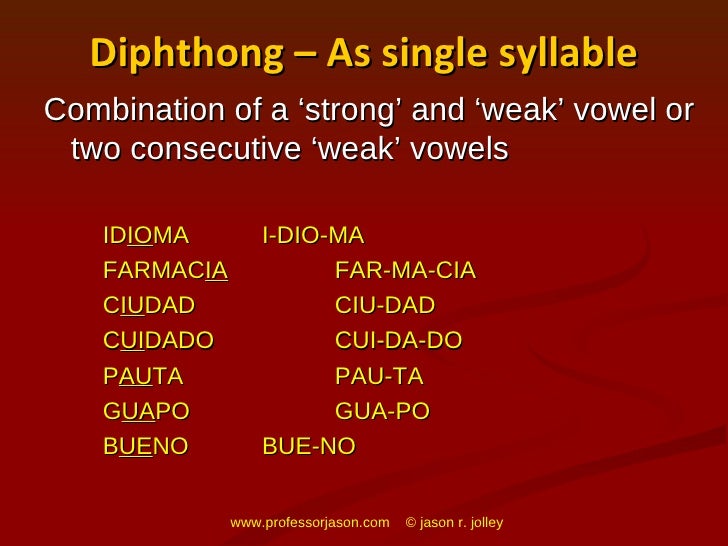Pronunciation of vowels in Spanish - Not a question
A post was made recently about fui, fuiste fue, etc I wanted to share this information for anyone having difficulty determining how to stress vowel combinations in words. The pronunciation guide in () below are designed for English speakers.
Diphthongs: AI, AY (eye) AU, AO (ow) EI, EY (ay) OI, OY (oy) EU (eoo)
Semivowels: IA, YA (yah) IE, YE (yeh) IO, YO (yo) IU (you) UA (wah) UE (weh) UI, UY (wee)
The 2 groups above are always one syllable in a word and the individual vowels are not separated in stress. When the combination is separated the first will have a written accent as in día, oír (I cannot think of any outside the í example, perhaps someone else can add to this).
Separate Syllables: AE (ah-eh) EA (eh-ah) EO (eh-oh) OA (oh-ah)
The above are found for example in trae (2 syllables) desea, deseo (3 syllables), oasis (3 syllables).
2 Answers
Great start, Jubi:
In my class, I try to make it simple for simple minds to understand.
I call ANY combination of a weak vowel and a strong vowel a "dipthong"
Weak vowels "U" and "I"----To memorize them think "You and I are weak." Therefore all the rest, "A" "E" and "O" are the strong ones.
Therefore we have "ua" "ue" "uo" (and the reverse), "au" "eu" and "ou", then the dipthongs beginning with "I".
They are "ia" "ie" "io" and the reverse "ai" "ei" and "oi".
There are even dipthongs formed with the two weak vowels: "iu" and "ui"
These are all counted as one syllable, with the stress slightly stronger on the second vowel. e.g. Luis sounds like "L'wees" (English phonetics)
I'll do a few combinations using English sounds. "fui" (F'wee) "fuiste" (F'weestay) "fue" (F'way) and so forth.
As Jubilado said these dipthongs may be broken up and turned into two syllables by the placing of an accent mark over the desired vowel.
Consider the boy's name "Mario" "io" is your dipthong, pronounced "Mar'yo".(two syllables)
Now check out the girls' name "María" pronounced "Ma-ree-a" with the stress on "ree". Now we have three syllables.
Jubilado also mentioned "día" pronounced "dee-ah" with the stress on "dee"
Another similar one "grúa" , pronounced "groo-a" with the stress on "groo."
As Jubilado pointed out. any combination of strong vowels does not constitute a dipthong, and therefore each vowel gets pronounced separately with the stress depending on the general rules of stress which I have discussed in an article. If I can find it I will append it to this post.
I need not repeat Jubilado's examples. They are just fine. I only wanted to throw in my two centavo's worth. ![]()
Do I need to mention that Spanish also has "tripthongs??" ¡Arrrrrggghhhh!
More dipthongs:

There is a British woman who is a teacher and now lives in Spain. She originally taught English to Spanish people but now helps British people living in the South of Spain. Her blog and videos are aimed at those who are familiar with British pronunciation and are now learning Spanish.
She has done 6 short videos about pronunciation including diphthongs, which are worth dipping your toe in!
Her name is Jane Cronin.
It is worth listening to all the videos.











